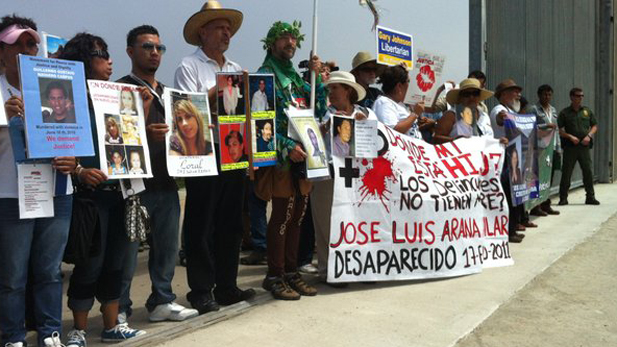 Survivors memorialize loved ones lost to Mexico's drug war at Border Field State Park in San Diego.
Survivors memorialize loved ones lost to Mexico's drug war at Border Field State Park in San Diego.By Diana Crofts-Pelayo and Jose Luis Jiménez, Fronteras Desk
Javier Sicilia expected to be remembered more for his words than for sparking the Caravan For Peace and Justice movement.
The poet dived into the dark world of Mexican politics and narcos after his son was killed in March 2011. Juan Francisco, a student who worked with drug addicts, was tortured and killed, along with six others. The killings were apparently to retaliate for two of the men telling police about a drug gang’s activities.
Sicilia did not wallow in his grief. He decided the drug war Mexican President Felipe Calderon was prosecuting hurt the people it was supposed to help: innocent civilians.
So he took to the streets in Mexico. In one march, he led about 100,000 people into the main square in Mexico City.
He now brings his crusade north.
The Caravan for Peace and Justice that crisscrossed Mexico lobbying for an end to the bloody drug war crossed the border into the United States Sunday. It will reach Arizona later this week with stops in Phoenix and Tucson.
The goal is to make Americans aware of their role in supporting Mexico’s powerful drug cartels. With a core group of about 100 people, Sicilia plans to crisscross the United States to bring a face to the violent headlines many see coming from Mexico.
“The only ones who are benefiting from all of this are people who are involved in the drug war," the soft-spoken Sicilia said in an interview. "The corrupt government officials. The army. Illicit businesses. The prisons. And the ones who are being destroyed are our fellow human beings.”
Jaime Montagne is part of the caravan. He has felt the impact of Mexico’s state of insecurity. His stepson went water skiing with several friends at a lake near Monterrey and disappeared. He has given police more information from his own inquiries than officers have given him.
Last year, criminals in Acapulco started an extortion plot against him.
"They kept calling us and telling my wife to sign the property over to them because they wanted it. Just because they wanted it," Montagne said. “(If not) they were going to kill one of us. One of the members of the family.”
He alerted the police. They did nothing. He moved his family to Mexico City.
Dora Elva Aguirre tightly clutched a poster that included a photo of her missing daughter, Judith.
Judith and some friends drove in an SUV from Monterrey to the border town of Reynosa, Mexico, about 140 miles away. They drove through the heart of territory controlled by violent cartels.
They never made it back.
“When she left, I told her: ‘My daughter, it is very dangerous,’" Aguirre recalled. "She said: ‘No, it has calmed down.’ They had done the trip twice before.”
The goal of the caravan, Sicilia said, is to spark a debate in the U.S. on several issues: ending the war on drugs and legalizing some drugs, an assault weapons ban; stopping money laundering; more help for addicts in the U.S. to reduce the cartels' main customer base.
While standing near the U.S.-Mexico border fence, he argued the problem is not one of a lack resources, but focusing on the wrong things.
“Because this a porous border for dirty money, for weapons and for drugs, it’s practically open," Sicilia said. "But when it comes to human beings, it is criminalized.”
He was among several speakers before a crowd of about 100 at Border Field State Park near San Diego. The next stop in the multi-bus caravan was Los Angeles. He plans to reach Washington, D.C., next month.
By then, he hopes Americans start seeing the war on drugs in a different way, perhaps through the eyes of a poet.
“The pain of each human being is the pain of every human being. And we need solidarity," Sicilia said. "If not, we risk losing the human condition that makes us special.”

By submitting your comments, you hereby give AZPM the right to post your comments and potentially use them in any other form of media operated by this institution.